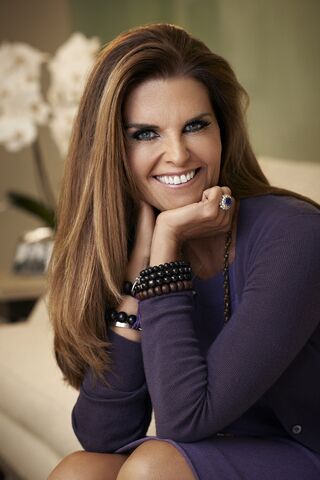Health
Interview: Maria Shriver on Alzheimer’s and Women's Health
Maria Shriver leads effort to solve why women are at greater risk for dementia.
Posted May 22, 2020

Maria Shriver is on a mission to save your mind. Shriver is a Peabody Award-wining American journalist, prolific author, creator of The Minerva Awards, philanthropist, and a mother of four. As the former First Lady of California, she built the nation’s premier forum for women, The Women’s Conference. She is the current chair of the California Governor’s Alzheimer’s initiative. She is the executive producer of HBO’s award-winning "The Alzheimer's Project,” and the founder of the Women’s Alzheimer’s Movement.
Shriver grew up in a family where service was deeply valued. John F. Kennedy, the 35th president of the United States, was her uncle. Former presidential candidates and U.S. senators Robert F. Kennedy and Ted Kennedy were also her uncles. Her mother, Eunice Kennedy Shriver, founded the Special Olympics. Her father, Sargent Shriver, was a Purple Heart recipient, a US Ambassador to France, the founder of the Peace Corps, and a presidential candidate. He was diagnosed with Alzheimer’s in 2003.
On May 21, 2020, Shriver shared a myth-busting report created by The Women’s Alzheimer’s Movement and AARP with scientific research looking at a number of factors, not just age, that may explain why women are at greater risk. According to the research, women comprise two-thirds of the 5.8 million Americans living with Alzheimer’s disease and make up over 60 percent of dementia caregivers. Additionally, women have a one in five chance of developing Alzheimer’s after age 45, whereas it is one in 10 for men.
The interview has been edited and condensed.
Cami Rosso: I read your report and found it eye-opening.
Maria Shriver: We just won a Gracie Award last week for my reporting on women’s health because people are unaware of this research gap when it comes to women. You can’t answer why women are disproportionately impacted by Alzheimer’s without looking at women’s health overall.
CR: In a way, now is an excellent time to bring this awareness. With an aging population, it is going to affect more people.
MS: I think a lot of people, from my experience, are really interested in brain health. I think people want that one-stop pill. We don’t have that. But what we do know is that there are lifestyle factors that you can do right now. So even if it delays cognitive impairment for five years, that’s really good for your family, and you. That saves your family a lot of money, heartache, sweat, and tears.
I would love to see a president make this their mission much like my uncle made getting us to the moon his priority. The brain is the next great frontier.
CR: Beautifully stated and inspiring. It reminds me of a couple of years back, the U.K. launched an initiative with the former Prime Minister David Cameron. What are your thoughts on that?
MS: I think it’s great. I was there last year at their global summit. I was the only woman there speaking on it, and he spoke too. I think it makes a huge difference.
CR: What impact, if any, does the COVID-19 pandemic have?
MS: I think what it does point out is how important it is to invest in science. If you think we’re underprepared for COVID, we are woefully underprepared for Alzheimer’s. If you look at all of the deaths in nursing homes, that has had very little attention in this COVID pandemic. People are dying in nursing homes. We are not prepared for the Alzheimer’s that is going on right now, and we’re really not prepared for the Alzheimer’s that will happen in five years.
CR: What are some things that you do to maintain brain health?
MS: I try to be conscious of my surroundings, sleep, meditation, and what I can do to keep myself curious, intellectually focused, and moving. I try to manage my stress better. If I had known in my mid-40s or even when I was 50 what I know today, I think I would have gone through menopause differently. I think I would have prioritized my brain health 15 years ago when it would have been really helpful to me.
CR: If you had to compare the destigmatization of being on the spectrum of neurological disorders such as the autism spectrum disorder, where do you see Alzheimer’s?
MS: Well I think that’s a good question. I think the challenge with Alzheimer’s is two-fold. Somebody with Alzheimer’s, in people’s minds, is old. And people have a real issue with that in this country. Ageism is alive as sexism is alive. I think it has a double stigma, and it’s a larger cultural thing that implies the loss of independence, and the loss of dignity.
CR: What are some ways that we can destigmatize dementia as individuals?
MS: The big thing is don’t recoil when someone tells you that they have Alzheimer’s. Don’t think right away that they can’t do anything, or that they don’t remember anything. Let them see that they won’t be shunned, or victimized. Let their families see that they will be championed, accepted, included, and supported. I think all these things are necessary, whether you have Alzheimer’s or not.
CR: In many ways, you’re leading a cultural shift.
MS: I’m trying to lead a huge women’s empowerment mission and have been in that space for years. And what I’ve discovered is that a lot of what is talked about is networking in your job, getting ahead, or asking for a raise. But if you can’t be healthy at work, or if you’re taking care of a parent with Alzheimer’s, networking at work is so low on your agenda. Yes, you’re sandwiched, but you are also strapped financially, squeezed emotionally, and completely at your wit’s end. We have to pull the curtain back on the reality of our lives. Share your story, that’s how things change.
Copyright © 2020 Cami Rosso All rights reserved.




